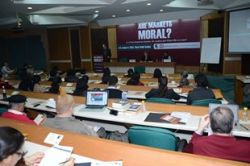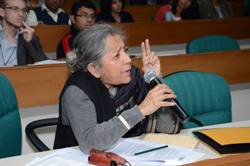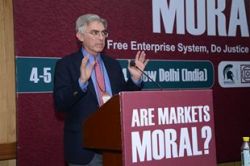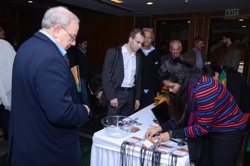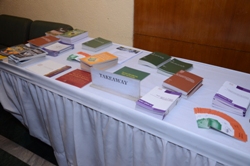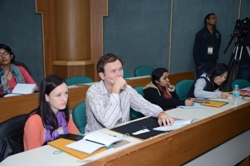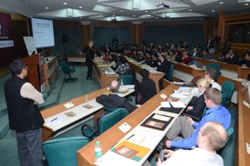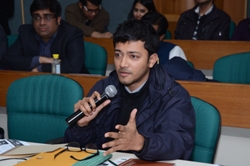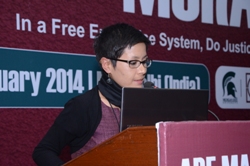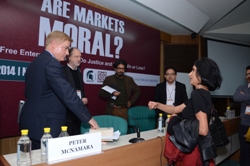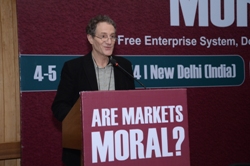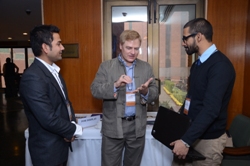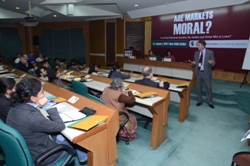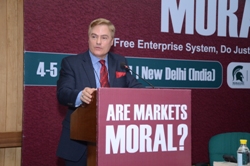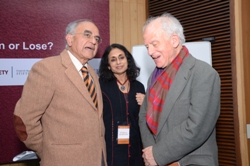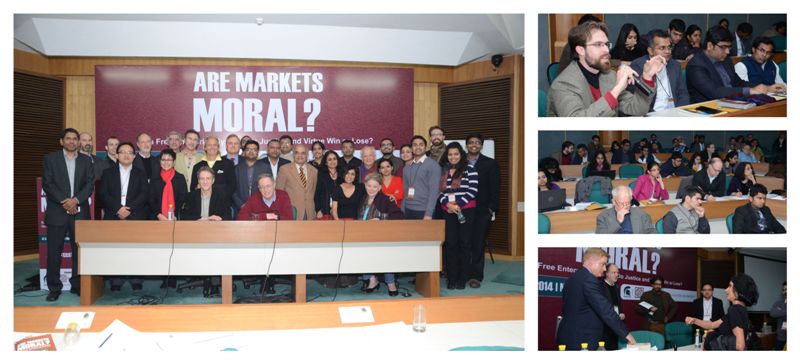 Are Markets Moral? Scholars, academics, think tank leaders, policy and opinion makers, and students came together on 4-5 January 2014 at India Habitat Centre, New Delhi to explore the complex relation between moral values and free markets. Are Markets Moral? Scholars, academics, think tank leaders, policy and opinion makers, and students came together on 4-5 January 2014 at India Habitat Centre, New Delhi to explore the complex relation between moral values and free markets.
Organised by Centre for Civil Society and the LeFrak Forum and the Symposium on Science, Reason, & Modern Democracy, a privately funded research center in the Political Science Department at Michigan State University in partnership with Friedrich Naumann Foundation, the conference brought scholars from India and abroad representing a broad spectrum of ideologies–Indian, Western, liberal, conservative and libertarian to deliberate and discuss how markets affect morality, the values they elevate and empower, and those they violate or undermine.
You will find a summary of the opening address and the six sessions below and photos of the conference online here. |
Bourgeois Dignity: Why Economics Can't Explain the Modern World
Speaker: Deirdre McCloskey | Chair: Parth J Shah |
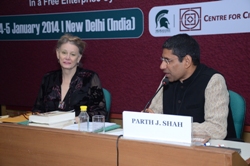 Deirdre McCloskey’s talk focused on how everyday rhetoric and the ideas we have about people have a direct impact on economic growth. She emphasised that capitalism is not inherently moral or immoral – that it is choices we make that define its morality. Debunking the commonly held idea that accumulation of capital, saving behaviour and change in institutions were responsible for the economic growth in the Industrial Revolution, she asserted that the most important change was in how we viewed the working class. She concluded by saying that a society where people are encouraged to imagine improvements through innovation and test their ideas in the market will flourish and leave people better off. Deirdre McCloskey’s talk focused on how everyday rhetoric and the ideas we have about people have a direct impact on economic growth. She emphasised that capitalism is not inherently moral or immoral – that it is choices we make that define its morality. Debunking the commonly held idea that accumulation of capital, saving behaviour and change in institutions were responsible for the economic growth in the Industrial Revolution, she asserted that the most important change was in how we viewed the working class. She concluded by saying that a society where people are encouraged to imagine improvements through innovation and test their ideas in the market will flourish and leave people better off.
Key Questions
-
You say institutions did not lead to economic growth, yet we see that growth in India began in 1991 after a major institutional change. The same is the case with countries like China and South Korea. Is this a coincidence?
-
Is the counterpart to the road to bourgeois dignity the road to serfdom? That is, if we don’t have social justice or social democracy we will be on that road?
-
Can the idea of ‘dignity’ be extended? India gained political freedom in 1947 but we lost economic freedom, which we regained in 1990, which is when our economy started growing. Now, twenty years later, we have achieved dignity, which is reflected in protest movements of Anna Hazare and the Aam Admi Party – it is the new middle class that has found its voice. Would you agree that the notion of dignity is not just an economic or rhetorical idea, but also a political one?
-
Why do you say that it is what people say about each other, rather than how people feel about themselves or each other that makes a difference?
For more information, you can write to Deirdre McCloskey at deirdre2@uic.edu |
The World Is Too Much With Us? On The Expanding Reach of the Market
Speaker: Steven Lukes | Discussant: Neera Badhwar | Chair: Shubhashis Gangopadhyay |
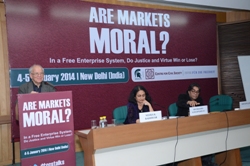 Steven Lukes’s paper focused on the pervasiveness of markets in our lives today as more and more goods and services become ‘marketised.’ Questioning how we should view these developments, he examined whether they constituted an expansion of freedom or a growing subjection. He also questioned whether it was possible to address this question using data at all, or whether it was simply a philosophical dilemma open to interpretation – a duck-rabbit question. Steven Lukes’s paper focused on the pervasiveness of markets in our lives today as more and more goods and services become ‘marketised.’ Questioning how we should view these developments, he examined whether they constituted an expansion of freedom or a growing subjection. He also questioned whether it was possible to address this question using data at all, or whether it was simply a philosophical dilemma open to interpretation – a duck-rabbit question.
Discussant:
Neera Badhwar focused on the aspect of Lukes’s paper that talked about how markets promote greater trust and empathy between people on the one hand, while also undermining the values necessary for their existence on the other. She stressed the importance of distinguishing between free markets and crony capitalism and between free markets and greed and critiqued his view that certain goods and services, that require a more ‘human touch’ should be kept out of the market.
Key Questions:
-
If you are forced to defend social democracy, to the extent that it defends monopolistic institutions, is that a defense you are prepared to make?
-
Is it wrong or irresponsible to urge regulation in the Indian economy, where prices or the output are determined by the government, where you can’t buy and sell land and where small land holders cannot use their land for mortgage?
-
Some of the limits on markets that you feel should be enforced on markets are enforced in India with worse outcomes. Do you think certain examples of limits that should be enforced on markets, for example in organ trade, should be reconsidered in the Indian context where the consequences are worse after regulation?
For more information, you can write to Steven Lukes at steven.lukes@nyu.edu |
Free Market Fairness
Speaker: John Tomasi | Discussant: Gurpreet Mahajan | Chair: Shikha Dalmia |
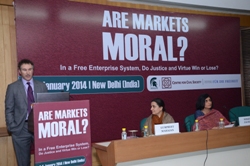 John Tomasi presented his new theory of social justice: Free Market Fairness, one that is committed to both limited government and the material betterment of the poor. He argued that property rights are best defended not in terms of self-ownership or economic efficiency but as requirements of democratic legitimacy but at the same time emphasised the importance of private economic liberty in people’s lives. He put forth his “market democratic” conception of social justice – with its twin commitment to economic liberty and a fair distribution of goods and opportunities – as a morally superior account of liberal justice. John Tomasi presented his new theory of social justice: Free Market Fairness, one that is committed to both limited government and the material betterment of the poor. He argued that property rights are best defended not in terms of self-ownership or economic efficiency but as requirements of democratic legitimacy but at the same time emphasised the importance of private economic liberty in people’s lives. He put forth his “market democratic” conception of social justice – with its twin commitment to economic liberty and a fair distribution of goods and opportunities – as a morally superior account of liberal justice.
Discussant:
Gurpreet Mahajan commented on Tomasi’s paper, questioning whether having contracts and fairness in the market was enough to achieve equality, which involves recognition of individuals as equal through a degree of inter-subjectivity that does not come from contracts; but agreed with Tomasi that we must move beyond the dichotomies that arise between economic liberty and social democracy and the like.
Key Questions:
-
Do you agree that there is a certain minimum standard of living people must have before we give them a market to allow them to fully appreciate the choice markets bring?
-
India started with Right to Property, Freedom of Speech and Freedom to Choose a Profession. Now, right to profession and speech have been removed and right to property was modified – which has since been removed from the constitution. Are there not certain core principles we should keep away from the deliberative process?
For more information, you can write to John Tomasi at john_tomasi@brown.edu |
Good and Bad Contracts: How Consequentialism Helps Define Moral Theory
Speaker: Richard Epstein | Discussant: Rajshree Chandra | Chair: Christopher Lingle |
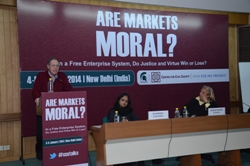 Epstein’s paper explored the moral foundations of contracts. He proposed that consequentialist arguments are part and parcel of the moral apparatus that are used to evaluate the desirability of capitalism and asserted that the only way in which to understand capitalism is in terms of its overall social utility, measured by Pareto and Kaldor-Hicks methods. Further, looking both at the contracts that are enforced, and those which are regarded as illegal and unenforceable, he showed how the overall system is put together in a way that identifies both those voluntary arrangements that should and should not be enforced. Epstein’s paper explored the moral foundations of contracts. He proposed that consequentialist arguments are part and parcel of the moral apparatus that are used to evaluate the desirability of capitalism and asserted that the only way in which to understand capitalism is in terms of its overall social utility, measured by Pareto and Kaldor-Hicks methods. Further, looking both at the contracts that are enforced, and those which are regarded as illegal and unenforceable, he showed how the overall system is put together in a way that identifies both those voluntary arrangements that should and should not be enforced.
Discussant:
Rajshree Chandra agreed with Epstein that consequentialism is important to consider contracts and the morality of markets but stated that the range of consequences considered needs to be wider. She critiqued Epstein’s claim, that we must find the grounds on which morality of markets can be established, and in a way that has universal valence. According to Chandra, this assumes a non-comparative idea of welfare and that membership to a cultural or political community is arbitrary; thereby overlooking the role of culture in determining harm, compensation and normative standards.
Key Questions:
-
What do we do, in a practical way, if we have a situation where a natural resource like bauxite is under a hill that local residents consider sacred? Currently in India, the Supreme Court often cancels projects and stops development in these cases. How could we take this forward given your view on contracts?
-
Can you comment on your consequentialist approach’s ability to safeguard individual freedom? Classically, utilitarianism has measured values by aggregation, ignoring the individuality of persons. While Kaldor-Hicks is an improvement on this, coercion seems to rush in once it is permitted in a single instance. Is there a principled way to stop this rush to coercion?
-
With regards to patents, is it not possible to have a market based solution, rather than law-granted monopolies for extended periods of time? Can we incentivise research by rewarding it and opening it for the market?
For more information, you can write to Richard Epstein at richard.epstein@nyu.edu |
Catching up with the West (and Western Liberalism): Chinese, Indian and Japanese Responses to Liberalism in the Early Twentieth Century
Speaker: Pankaj Mishra | Discussant: Tom Palmer | Chair: Wan Saiful Wan Jan |
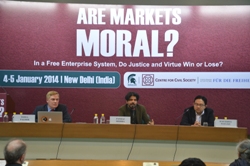 Pankaj Mishra, in his paper, referenced some of the most prominent thinkers and activists in India, China and Japan. Juxtaposing their ideas with liberal thinkers of the West, he highlighted how their concepts of self-interest, individual liberty and democracy were created through the imperative of creating a modern nation-state, and protecting civilisations that appeared to face threat from imperialist forces. According to Mishra, one of the reasons free market ideas have not caught on in India is that we entered the modern world late and found it difficult to reconcile ideas of liberalism and modernity with identity seeking and nation building. Pankaj Mishra, in his paper, referenced some of the most prominent thinkers and activists in India, China and Japan. Juxtaposing their ideas with liberal thinkers of the West, he highlighted how their concepts of self-interest, individual liberty and democracy were created through the imperative of creating a modern nation-state, and protecting civilisations that appeared to face threat from imperialist forces. According to Mishra, one of the reasons free market ideas have not caught on in India is that we entered the modern world late and found it difficult to reconcile ideas of liberalism and modernity with identity seeking and nation building.
Discussant:
Tom Palmer provided a strong critique of Mishra’s paper highlighting instances where a loose definition of liberalism had led to incorrect conclusions about free market economics and the Eastern response to it. He felt that there was an identification of all western political systems with liberalism, which is a dangerous assumption in the current discourse around economic systems.
Key Questions:
-
Given the doubts you raise about the ‘liberal’ nature of people involved in the Indian freedom movement, how were we able to raise such a liberal Indian Constitution?
-
Is your normative framework liberal or non-liberal? And why is a liberal framework bad for India?
-
Why are you not optimistic that in one or two generations, India can achieve a modern standard of living? Is there something fundamentally anti-growth about Indian culture?
For more information, you can write to Pankaj Mishra at info@pankajmishra.com |
Religion and Economy in Enlightenment Political Thought
Speaker: Andrew Bibby | Discussant: Peter McNamara | Chair: Gurcharan Das |
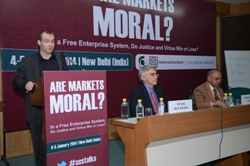 Andrew Bibby’s presentation focused on the relationship between economics and religion –delving into the less-explored area of how religion impacts the market, viewing it as an explanation for market processes, with focus on the writings of Montesquieu. Using Montesquieu as an illustrative example, Bibby demonstrated the effects of religion on markets in terms of organisation, practices, values and spiritual experience and expectations. Andrew Bibby’s presentation focused on the relationship between economics and religion –delving into the less-explored area of how religion impacts the market, viewing it as an explanation for market processes, with focus on the writings of Montesquieu. Using Montesquieu as an illustrative example, Bibby demonstrated the effects of religion on markets in terms of organisation, practices, values and spiritual experience and expectations.
Discussant:
Peter McNamara provided commentary on Bibby’s paper, complimenting his focus on Montesquieu who helped dissolve the dichotomy between market mania and market phobia and provided a model for inquiry into issues regarding the morality of markets. He mentioned that Bibby could have provided a stronger account of Montesquieu’s theory that commerce changes attitudes, making human beings gentler and better.
Key Questions:
-
Did you use tests of statistical significance to check the relationship between economic growth and religion?
-
Did Montesquieu explore the effect of aspects of Christianity – that said your sins could be absolved – on market behaviour?
-
In India, we do not have clear definitions of ‘evil’ which seems to play a big role in the west. ‘Good’ and ‘bad’ are relative terms based on ends achieved. In this context, when translating economic or liberal concepts, how do we inform the markets with religion?
For more information, you can write to Andrew Bibby at andrew.bibby@cnu.edu |
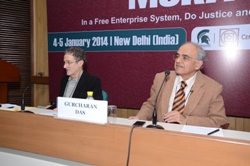 The two-day conference was closed out by a talk on the Dharma of Capitalism by Gurcharan Das which discussed the morality of markets in the Indian context, where dharma or doing the right thing governs our actions. According to him, when we act according to the common dharma or norms, there is trust and harmony, which creates conditions conducive for free markets. The two-day conference was closed out by a talk on the Dharma of Capitalism by Gurcharan Das which discussed the morality of markets in the Indian context, where dharma or doing the right thing governs our actions. According to him, when we act according to the common dharma or norms, there is trust and harmony, which creates conditions conducive for free markets.
|
|
| Books to Watch: |
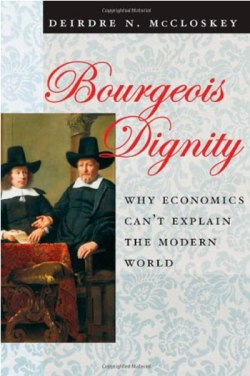 |
Bourgeois Dignity: Why Economics Can’t Explain the Modern World
- Deridre McCloskey |
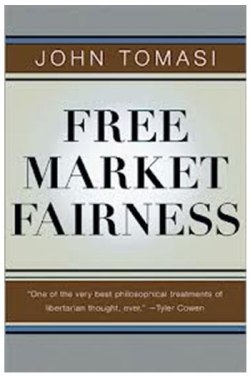 |
Free Market Fairness
- John Tomasi |
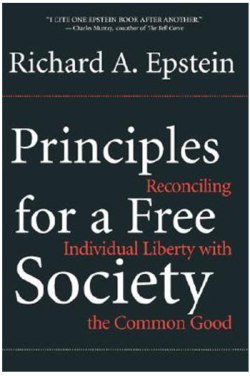 |
Principles for a Free Society
- Richard A. Epstein |
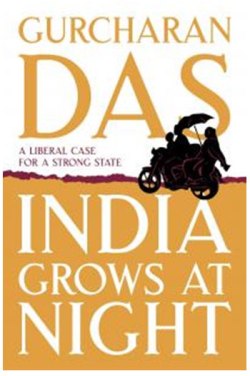 |
India Grows at Night
- Gurcharan Das |
|

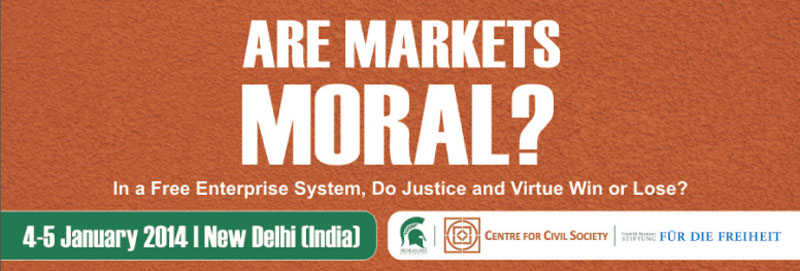
 Are Markets Moral? Scholars, academics, think tank leaders, policy and opinion makers, and students came together on 4-5 January 2014 at India Habitat Centre, New Delhi to explore the complex relation between moral values and free markets.
Are Markets Moral? Scholars, academics, think tank leaders, policy and opinion makers, and students came together on 4-5 January 2014 at India Habitat Centre, New Delhi to explore the complex relation between moral values and free markets. Deirdre McCloskey’s talk focused on how everyday rhetoric and the ideas we have about people have a direct impact on economic growth. She emphasised that capitalism is not inherently moral or immoral – that it is choices we make that define its morality. Debunking the commonly held idea that accumulation of capital, saving behaviour and change in institutions were responsible for the economic growth in the Industrial Revolution, she asserted that the most important change was in how we viewed the working class. She concluded by saying that a society where people are encouraged to imagine improvements through innovation and test their ideas in the market will flourish and leave people better off.
Deirdre McCloskey’s talk focused on how everyday rhetoric and the ideas we have about people have a direct impact on economic growth. She emphasised that capitalism is not inherently moral or immoral – that it is choices we make that define its morality. Debunking the commonly held idea that accumulation of capital, saving behaviour and change in institutions were responsible for the economic growth in the Industrial Revolution, she asserted that the most important change was in how we viewed the working class. She concluded by saying that a society where people are encouraged to imagine improvements through innovation and test their ideas in the market will flourish and leave people better off. Steven Lukes’s paper focused on the pervasiveness of markets in our lives today as more and more goods and services become ‘marketised.’ Questioning how we should view these developments, he examined whether they constituted an expansion of freedom or a growing subjection. He also questioned whether it was possible to address this question using data at all, or whether it was simply a philosophical dilemma open to interpretation – a duck-rabbit question.
Steven Lukes’s paper focused on the pervasiveness of markets in our lives today as more and more goods and services become ‘marketised.’ Questioning how we should view these developments, he examined whether they constituted an expansion of freedom or a growing subjection. He also questioned whether it was possible to address this question using data at all, or whether it was simply a philosophical dilemma open to interpretation – a duck-rabbit question. John Tomasi presented his new theory of social justice: Free Market Fairness, one that is committed to both limited government and the material betterment of the poor. He argued that property rights are best defended not in terms of self-ownership or economic efficiency but as requirements of democratic legitimacy but at the same time emphasised the importance of private economic liberty in people’s lives. He put forth his “market democratic” conception of social justice – with its twin commitment to economic liberty and a fair distribution of goods and opportunities – as a morally superior account of liberal justice.
John Tomasi presented his new theory of social justice: Free Market Fairness, one that is committed to both limited government and the material betterment of the poor. He argued that property rights are best defended not in terms of self-ownership or economic efficiency but as requirements of democratic legitimacy but at the same time emphasised the importance of private economic liberty in people’s lives. He put forth his “market democratic” conception of social justice – with its twin commitment to economic liberty and a fair distribution of goods and opportunities – as a morally superior account of liberal justice. Epstein’s paper explored the moral foundations of contracts. He proposed that consequentialist arguments are part and parcel of the moral apparatus that are used to evaluate the desirability of capitalism and asserted that the only way in which to understand capitalism is in terms of its overall social utility, measured by Pareto and Kaldor-Hicks methods. Further, looking both at the contracts that are enforced, and those which are regarded as illegal and unenforceable, he showed how the overall system is put together in a way that identifies both those voluntary arrangements that should and should not be enforced.
Epstein’s paper explored the moral foundations of contracts. He proposed that consequentialist arguments are part and parcel of the moral apparatus that are used to evaluate the desirability of capitalism and asserted that the only way in which to understand capitalism is in terms of its overall social utility, measured by Pareto and Kaldor-Hicks methods. Further, looking both at the contracts that are enforced, and those which are regarded as illegal and unenforceable, he showed how the overall system is put together in a way that identifies both those voluntary arrangements that should and should not be enforced. Pankaj Mishra, in his paper, referenced some of the most prominent thinkers and activists in India, China and Japan. Juxtaposing their ideas with liberal thinkers of the West, he highlighted how their concepts of self-interest, individual liberty and democracy were created through the imperative of creating a modern nation-state, and protecting civilisations that appeared to face threat from imperialist forces. According to Mishra, one of the reasons free market ideas have not caught on in India is that we entered the modern world late and found it difficult to reconcile ideas of liberalism and modernity with identity seeking and nation building.
Pankaj Mishra, in his paper, referenced some of the most prominent thinkers and activists in India, China and Japan. Juxtaposing their ideas with liberal thinkers of the West, he highlighted how their concepts of self-interest, individual liberty and democracy were created through the imperative of creating a modern nation-state, and protecting civilisations that appeared to face threat from imperialist forces. According to Mishra, one of the reasons free market ideas have not caught on in India is that we entered the modern world late and found it difficult to reconcile ideas of liberalism and modernity with identity seeking and nation building. Andrew Bibby’s presentation focused on the relationship between economics and religion –delving into the less-explored area of how religion impacts the market, viewing it as an explanation for market processes, with focus on the writings of Montesquieu. Using Montesquieu as an illustrative example, Bibby demonstrated the effects of religion on markets in terms of organisation, practices, values and spiritual experience and expectations.
Andrew Bibby’s presentation focused on the relationship between economics and religion –delving into the less-explored area of how religion impacts the market, viewing it as an explanation for market processes, with focus on the writings of Montesquieu. Using Montesquieu as an illustrative example, Bibby demonstrated the effects of religion on markets in terms of organisation, practices, values and spiritual experience and expectations. The two-day conference was closed out by a talk on the Dharma of Capitalism by Gurcharan Das which discussed the morality of markets in the Indian context, where dharma or doing the right thing governs our actions. According to him, when we act according to the common dharma or norms, there is trust and harmony, which creates conditions conducive for free markets.
The two-day conference was closed out by a talk on the Dharma of Capitalism by Gurcharan Das which discussed the morality of markets in the Indian context, where dharma or doing the right thing governs our actions. According to him, when we act according to the common dharma or norms, there is trust and harmony, which creates conditions conducive for free markets.



